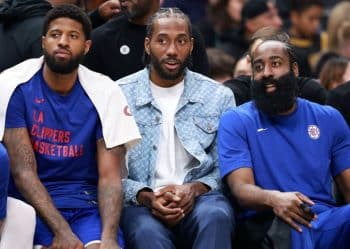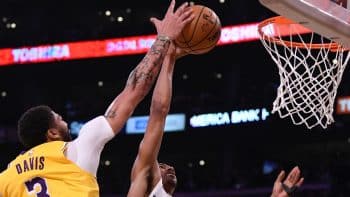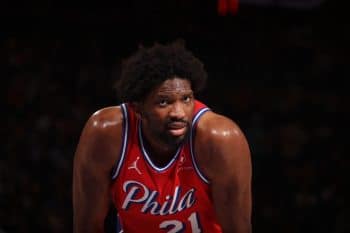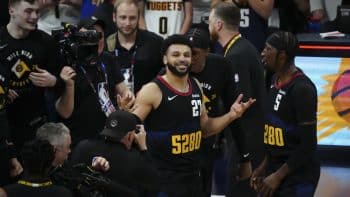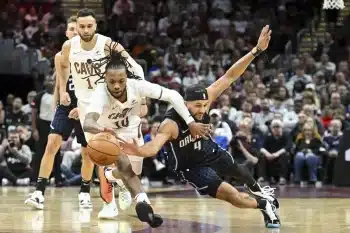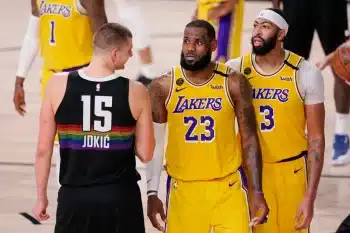NBA
Joe Alexander Blasts the Milwaukee Bucks, Explains Overseas Move
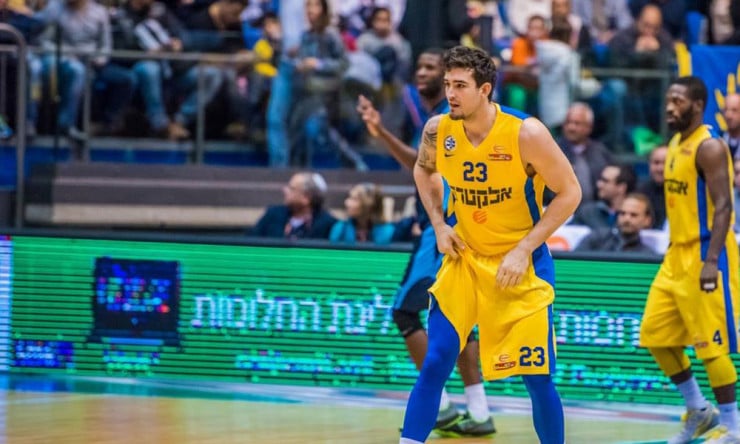
When you start typing Joe Alexander’s name into Google, the site tries to finish the search for you by adding the word “bust.”
The fact that this is the first suggested search for Alexander bothers the former NBA lottery draft pick, because he hates that the label has been attached to him.
Alexander, once considered the most athletic prospect in the 2008 NBA Draft before going to the Milwaukee Bucks with the eighth overall pick is constantly reminded that he didn’t live up to expectations in the NBA.
Alexander was selected ahead of players such as Serge Ibaka, Brook Lopez, Roy Hibbert, Nicolas Batum and Ryan Anderson among others. But he appeared in just 67 games in the NBA, suiting up for the Milwaukee Bucks and Chicago Bulls over one and a half seasons, before he was out of the league.
He knows many people look at him as a failure, but he believes the Bucks are just as much to blame for his struggles.
“I don’t think there is a hard definition of what a ‘draft bust’ is,” Alexander told Basketball Insiders. “Ultimately not being in the NBA is on me, but as far as ‘who is a bust?’ you have to look at Milwaukee and the management that drafted me. If you want to label anyone with the term ‘bust’ — it’s the Bucks. When Milwaukee drafted me, I was touted as a ‘project’ and someone with a lot of potential who could contribute had I learned to play the game. That’s what the Bucks told me. I needed time. I didn’t start playing basketball until I was 16 years old, but I was the most athletic guy in the entire draft. The Bucks knew that. Everyone understood this. I could’ve been drafted by any other team in the league and they would’ve given me time to develop.
“Obviously the No. 8 pick is expected to have an illustrious and longer NBA career than I’ve had, so that’s fine, but I think that Milwaukee should certainly share that [bust] label. They contributed heavily to it. Heavily. For the Bucks to pull the plug on me, I thought, was dramatically irresponsible on their part. What it did was label me as some sort of a problem player. It made everyone in the league look at me different when 12 months before any team would’ve died to have me.”
Injuries and struggles certainly affected Alexander’s NBA career, but he believes he was also the victim of a dysfunctional regime.
Alexander made it clear that he felt abandoned by the organization that once believed in his abilities. All he wanted was a fair shot, but he feels he didn’t receive that.
“I had a normal, mediocre NBA rookie season,” Alexander said. “If you look at my per-36 numbers, I was on par with every player in the draft except for Derrick Rose. There are players in the league who a few years ago played spotty minutes and made mistakes, but were able to learn from them. That’s an opportunity I wasn’t given in Milwaukee.”
Alexander was selected under the umbrella of long-time owner Herb Kohl, general manager John Hammond and head coach Scott Skiles. Kohl sold the team to Marc Lasry and Wesley Edens last year and Skiles was fired as the team’s head coach in 2013. Hammond is the only individual still with the Bucks, as he continues to serve as the franchise’s general manager.
It seems that Alexander’s biggest issue was with ownership and he believes a big reason for the Bucks’ turnaround this season is the transition to Lasry and Edens. Milwaukee is currently 21-20, which puts them in the Eastern Conference’s sixth seed, and on pace to make the playoffs after finishing with the league’s worst record last year (15-67).
“The biggest change in that organization now, and the reason for its success, is the new ownership,” Alexander said. “As anyone in the business world knows, organizations function from the top down. When the guys at the top of the pyramid are changed, the whole culture of the organization changes. Having been real close to situation, I know that it was very dysfunctional when I was at Milwaukee.”
Alexander insists that others shared this same opinion of the Bucks’ brass during his stint with the team.
“I was told by coaches, during and afterwards, that I fell into a tumultuous situation, a dysfunctional situation,” Alexander said, “Coaches who were with me expressed regret that I didn’t get to go somewhere else and experience how real NBA teams work with young players.”
In the years since, Alexander has had stints with D-League teams, a Russian squad and, now, with reigning European champions Maccabi Tel Aviv in Israel as he tries to resurrect his career and find a path back to the NBA.
Having recovered from a stress fracture in his foot, which forced him to take a two-year absence away from basketball, Alexander bounced back by becoming one of the top power-forwards in the D-League. He averaged 21.7 points, eight rebounds and 1.7 blocks in 13 games for the Santa Cruz Warriors – numbers that would normally turn heads in NBA circles.
Yet, with the D-League Showcase on the horizon and Alexander emerging as a virtual lock to get a 10-day call-up to the NBA, he made a bold move and signed overseas in late Dec.
“I was trying to make a push to get back to the NBA, but I left the D-League when I started to get the feeling that no matter how well I played, nobody cares,” Alexander said. “To me, that thought was a living hell.”
Alexander penned an agreement worth $16,000 per month for the remainder of the season with the Israeli powerhouse. For the sake of comparison, the value of his D-League contract was $19,000 total for the season.
Over the weekend, as Maccabi’s huddle crumbled at center-court after a Euroleague prep-practice, reporters mobbed Alexander ahead of his Euro-competition debut against Spanish favorites Barcelona. He was coming off of an impressive performance, scoring 17 points on 7-for-11 shooting from the floor and adding eight rebounds in 25 minutes during a 103-76 triumph over domestic rival Ironi Nahariya.
Still, things just didn’t add up. Why did Alexander opt-out of his D-League pact just one week before the showcase, as opposed to waiting for that NBA opportunity? The timing seemed strange, to say the least.
“I thought going overseas was a necessary change, especially to Israel and Maccabi which are a respected league and team,” Alexander said. “Along those same lines, I feel like the future of D-League players is unknown.
“One season, there might be just 10 call-ups. The next season there could be 35 call-ups, and then there is the factor of who sticks in the NBA? I worked real hard this season to put up another five-or-seven points and grab at least three more rebounds each game, but NBA executives would look at the numbers and be like, ‘Who cares?’”
He also felt like the best-case scenario staying in the D-League would be getting a 10-day contract from an NBA team, which wouldn’t have provided him with any long-term security or a real opportunity to show what he could do in the NBA.
“Don’t get me wrong, considering where I was with injuries getting a 10-day contract would be beyond words to me, but I don’t think NBA teams are seriously considering D-League guys for long-term roster spots,” Alexander said. “The prospect of playing at a high level overseas and getting a longer contract is a risk I was willing to take. I wouldn’t spend a whole season not getting paid in hopes of a 10-day call-up. That’s not my ultimate goal.”
Alexander made it clear that he valued his time in Santa Cruz and that the D-League is more competitive than most people think, but he just didn’t think it was right for him at this time.
“The outside perspective of the D-League is at an all-time low, but the Santa Cruz team I played for was phenomenal,” Alexander said. “A lot of guys that go overseas can’t score in double-figures in the D-League after believing it’s a joke and that they could walk all over it. I’ve seen that all the time. NBA players come down to the D-League believing they’ll wreck the league and get called back up, and then some of them can’t even break the lineup.”
Officials for Maccabi scouted Alexander in the flesh during a pair of back-to-back showings versus the Idaho Stampede. Alexander stood out with ease, registering 22 points and seven rebounds as the Warriors won both encounters. Though he knew nothing about Israel, it didn’t take long for Alexander to pull the trigger and kill all hope of an NBA contract this season.
Heading overseas wasn’t all too unfamiliar for Alexander, who turned 28 years old last month. He was born in Taiwan, and he traveled the world due to his father’s employment. From Taiwan, Alexander relocated to the United States then to Hong Kong then to China and then back to the U.S. all before his junior year of high school.
While he was exposed to diverse cultures throughout his upbringing, and though he was a stud in college with West Virginia (admittedly to his surprise), it was his time in the pros with the Bucks, Bulls and later with the Hornets (with whom he never appeared in an actual game) that really frustrated Alexander. He was always told what to do and pigeonholed as a certain kind of player, even though he completely disagreed with the assessments. He was told not to do things that he felt were his strengths, and this irritated him. He feels like he his image caused people to misjudge his game.
“There’s an element in the basketball culture, especially in the NBA, that looks at clean-cut guys like myself and assumes what we can or can’t do and that followed me throughout my NBA career,” Alexander said. “I became sick of it, so I looked around the league to guys who had similar games as me and that at one point in their lives were clean-cut such as Mike Miller and the ‘Birdman’ (Chris Andersen). [I realized] those players had long hair, tattoos, things like that.”
While a member of the Texas Legends, Alexander wanted to send a message so he grew his hair long, just like Miller’s. His campaign in the D-League was a success as he averaged 20.2 points and 8.9 rebounds per contest, earning a spot at the All-Star game. He then got an arm-length tattoo, just like Andersen’s, which consisted of three things that symbolize him most: a basketball (to represent his love and passion for the game), wings (for his incredible athleticism and hops) and a skeleton (to exhibit his inner-demons that battle his clean-cut image).
“I got the tattoo because I was sick of people telling me to shoot three-pointers and I was sick of people telling me to not put the ball on the floor or attack the rim, because that’s my game,” Alexander said. “In college, I was a bruiser and it was understood I was going to knock people around, and that I was super-athletic and super-skilled. But in the pros, it’s a different culture. It’s assumed, no matter how many times we hit people, that clean-cut players are soft – and I was so sick of that. I want my image to reflect who I am as a basketball player.”
Alexander has been through a lot over the last seven years, but he finally feels in control of his life and career. He’s enjoying his time overseas, where he’s doing everything to shed his draft bust label and change the way he has been perceived in the past.
